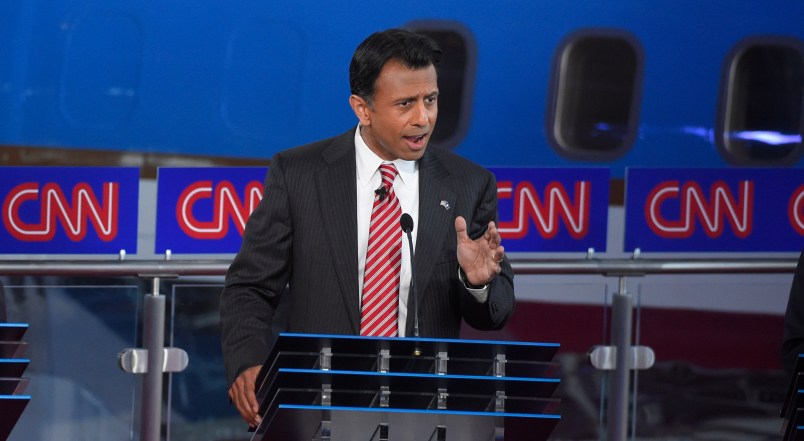One of the unifying moments at the last GOP debate was when the candidates agreed that in America, people should speak English, to raucous applause. It came on the heels of Bobby Jindal’s declarations in the first debate that “immigration without assimilation is invasion.” The Republican candidates were were echoing a sentiment that Americans are largely getting behind, one that reflects the immigration panic increasingly prevalent in America.
But the “Americans Speak English” debate is not about English. It’s not even about Spanish, illegal immigration, or assimilation. In fact, whether or not immigrants learn English isn’t that important to the “Learn English” crowd; the truth is, immigrants are learning English, at much faster rates than European immigrants a century ago were. For much of this inflamed ‘“speak English!”’ nativist crowd, even going to lengths to do what they say isn’t enough. My father, an immigrant, spent years mastering English, but that doesn’t stop many Americans from expressing mockery and disgust at South Asian accents like his.
National unity doesn’t particularly factor in either. If it did, then all immigrants, regardless of country of origin, would be placed under the same scrutiny. In reality, America cherry-picks the immigrants it hassles about assimilation. We treat the languages of immigrants from western, European, white countries as fun and interesting. We see their people as civilized and therefore not needing to assimilate to the same degree. European languages and accents are given a respect entirely absent in Americans’ approaches towards other foreign languages.
Many immigrants will be quick to tell you their stories of how lost job offers, daily scorn and discrimination follow when they reveal an immigrant origin through their words or accent. Some immigrants, however, don’t have to hide their heritage at all to have a chance in America: Americans can’t get enough of British accents, which British immigrants sometimes emphasize for their professional good. A 2015 Pew Research Center survey found that out of all immigrant populations, European immigrants were seen as least threatening with only 9 percent percent of Americans viewing their impact on American society as negative, compared to Middle Easterners’ 39 percent percent, Latinos’ 37 percent percent, Africans’ 22 percent percent, and Asians’ 11 percent percent. Unsurprisingly, this finding divided along racial lines, with white Americans by far the most likely to view immigrants groups negatively.
The national dialogue on language, which focuses on the Mexicans, the Muslims, the Syrians, and other populations we find most menacing barely manages to mask racial hostility. Our suspicion about Middle Eastern peoples, for example, runs so deep that we are unwilling to take in thousands of war-torn refugees because our first reaction towards them is distrust, regardless of whether they may actually be a threat.
Many Americans’ anger toward immigrants is so pronounced that even speaking a language other than English can get you labeled an un-American heretic, as Jeb Bush found out. Commentators and politicians love to discuss the evils of multiculturalism, and immigrants are told from all sides that they should be integrating into “American society”—whatever that means. If immigrants live and work in a country they love and whose principles they respect, what is there for them to assimilate into? What part of speaking Spanish to one’s parents or going to Eid celebrations is un-American in a country whose very fabric is made of multiculturalism? By couching our sentiments in issues less offensive on the surface, such as whether immigrants should speak English, we have allowed a level of xenophobia and racism to creep into our society that wouldn’t be out of place in a dystopian movie.
The real issue is not English, but these people’s ethnicities and their presence here, a reality America does not know how to or want to deal with. Language is one of those things that often hides deeper issues, and in this case our national preoccupation with English is a stand-in for nativist frenzy. Let’s be honest about what we’re really asking of these immigrants when we tell them to speak English: to not threaten our fragile, racially based American ideal, to pull a Jindal on ourselves and disavow and be ashamed of any culture that is not white or descended from white immigrants.
Emaan Majed is a student and writer whose work focuses on immigration, race, and US-Pakistan relations. Her Twitter handle is @emaanmj.







You are correct. It is about ignorance, insecurity and pure undiluted bigotry.
It is bigotry. And one of the great ironies is that many of the people demanding immigrants speak English (or, as they often call it, “American”) are the personification of illiteracy.
A nice article and a salient point, but let’s not go too far.
The reality of foreign languages is a reality American conservatives can’t deal with. I don’t concede that America=what conservatives think.
I like your essay but this is a complicated issue. The first words my professor uttered in a sociolinguistics class were ‘Language is power’. How you speak reflects: and to some measure determines, your social status. I agree that the Donald Trump inspired ‘English only’ is mainly xenophobic. However, it is another thing to champion multiculturalism and then ignore people trapped in a permanent subclass because they don’t speak English.
The people who make fun of your father are total jerks and idiots. I have great respect for any foreign born person who masters English: it is a great accomplishment. Americans should have a greater understanding and respect for other languages and cultures, but people deciding to live in the U.S. should definitely learn and use English if they can.
The" English only" types aren’t trumpeting how happy they’d be if we had more immigrants from Barbados or Belize or Maoris from New Zealand or India.